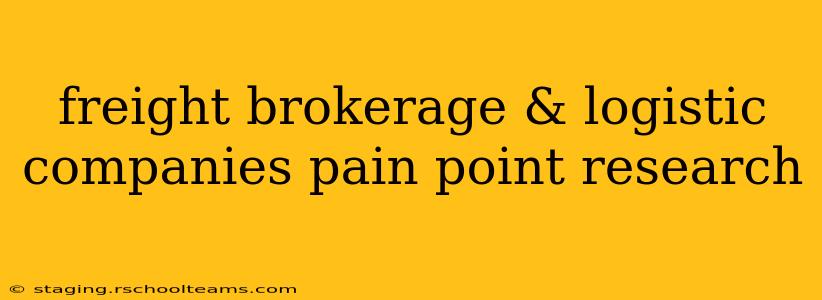The freight brokerage and logistics industry is a complex and dynamic landscape, constantly evolving to meet the demands of a globalized marketplace. While offering lucrative opportunities, it's also fraught with challenges. This in-depth analysis dives into the key pain points experienced by freight brokerage and logistics companies, exploring their root causes and offering potential solutions. We'll examine everything from finding reliable carriers to navigating complex regulations and managing operational efficiency.
Finding and Retaining Qualified Carriers
One of the most significant hurdles faced by freight brokerage and logistics companies is securing and maintaining relationships with reliable carriers. The industry suffers from a driver shortage, leading to increased competition for available capacity and fluctuating rates. This creates uncertainty in planning and execution, impacting profitability and customer satisfaction.
Solutions:
- Invest in carrier relationship management (CRM) systems: These systems help track carrier performance, communication history, and compliance records, fostering stronger, more efficient partnerships.
- Develop robust carrier onboarding processes: Streamline the process of vetting and onboarding new carriers to ensure they meet safety and compliance standards.
- Offer competitive compensation and benefits: Attracting and retaining quality carriers requires offering rates and benefits that are competitive within the market.
- Build a strong brand reputation: A positive reputation attracts top-tier carriers who prioritize long-term partnerships.
Managing Fluctuating Fuel Prices and Surcharges
Fuel costs are a major expense for freight brokerage and logistics companies, and their volatility directly impacts profitability. Unpredictable fuel price swings make accurate cost estimations challenging, hindering effective bidding and pricing strategies. Furthermore, accurately factoring in and applying fuel surcharges can be complex and time-consuming.
Solutions:
- Implement fuel hedging strategies: Strategies like fuel price hedging can help mitigate risk associated with fuel price fluctuations.
- Utilize fuel price forecasting tools: Sophisticated software can analyze market trends and provide more accurate predictions of future fuel prices.
- Negotiate fuel surcharges with carriers: Transparent and clearly defined fuel surcharge agreements protect profitability.
- Explore alternative fuels and technologies: Investing in research and adoption of alternative fuels and technologies can reduce long-term fuel dependency.
Maintaining Compliance with Regulations
The transportation industry is heavily regulated, with numerous federal, state, and local rules governing safety, security, and environmental compliance. Staying abreast of these ever-changing regulations and ensuring complete compliance is a significant operational burden. Non-compliance can result in hefty fines and reputational damage.
Solutions:
- Invest in regulatory compliance software: Specialized software can track regulatory changes and help companies maintain compliance.
- Develop a comprehensive compliance program: A well-defined program with clearly defined roles and responsibilities ensures compliance is prioritized throughout the organization.
- Partner with regulatory compliance experts: External consultants can provide expert guidance on navigating complex regulations.
- Stay informed through industry associations and publications: Actively monitoring industry news and best practices keeps companies up-to-date on regulatory changes.
Optimizing Logistics and Supply Chain Management
Efficient logistics and supply chain management are critical to profitability. Optimizing routes, managing inventory, and coordinating shipments effectively are essential to minimize costs and maximize efficiency. Inefficiencies in these areas can lead to delays, increased costs, and dissatisfied customers.
Solutions:
- Implement Transportation Management Systems (TMS): TMS software streamlines the shipment process, optimizing routes and reducing transportation costs.
- Utilize route optimization software: Advanced route planning software can help determine the most efficient routes based on real-time traffic data and other relevant factors.
- Improve communication and collaboration: Effective communication between all parties involved in the supply chain is crucial for efficiency.
- Embrace technology such as AI and machine learning: Advanced algorithms can predict potential disruptions and optimize logistics in real-time.
Managing Cash Flow and Accounts Receivable
Maintaining healthy cash flow is essential for the survival and growth of any business, and the freight brokerage industry is no exception. Slow payments from customers and managing accounts receivable can present significant challenges.
Solutions:
- Implement robust invoicing and payment processes: Clear and timely invoicing is crucial for speeding up payments.
- Offer flexible payment options: Providing various payment options to customers can help improve cash flow.
- Use factoring or invoice financing: Short-term financing options can help manage cash flow until payments are received.
- Conduct thorough credit checks on customers: This can help to minimize the risk of non-payment.
Building and Maintaining Strong Customer Relationships
In a competitive market, maintaining strong customer relationships is paramount. Building trust and providing excellent customer service are essential for retaining existing clients and attracting new ones.
Solutions:
- Invest in customer relationship management (CRM) systems: CRM systems help track customer interactions, preferences, and needs, leading to personalized service.
- Provide proactive communication and updates: Keeping customers informed throughout the shipping process fosters trust and transparency.
- Offer excellent customer support: Addressing customer concerns promptly and effectively builds strong relationships.
- Develop a strong company culture focused on customer satisfaction: Prioritizing customer needs throughout the organization fosters loyalty.
By addressing these pain points proactively, freight brokerage and logistics companies can improve efficiency, enhance profitability, and build a sustainable business. The successful companies will be those that embrace technology, prioritize strong relationships, and maintain a laser focus on compliance and operational excellence.
